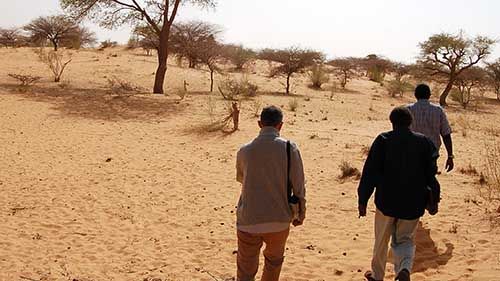Desertification and drought constitute one of the international environmental problems whose global importance has been recognised by the international community. This importance is clearly visible in the massive endorsement that states have given to the United Nations Convention to Combat Desertification in those countries experiencing serious drought and/or desertification, particularly in Africa. The Convention was adopted in 1994.

Desertification is the degradation of land in arid, semi-arid and sub-humid dry areas caused mainly by climatic changes and human activities. It is accompanied by a reduction in the natural potentials of the land, and depletion in surface and ground water resources.
But, above all, it has negative repercussions on the living conditions and the economic development of the people affected by it. Desertification and drought affect about one-sixth of the world’s population, 70% of all drylands, amounting to 3.6 billion hectares, and one quarter of the total land area of the world.
The United Nations General Assembly in 1994 declared June 17 as the World Day to Combat Desertification and Drought as the twin disasters were acknowledged as global problems because they affected all regions of the world. So, this day, June 17 was for the promotion and awareness of the need for international cooperation to combat desertification and the effects of drought, and on the implementation of the Convention to Combat Desertification and the celebration has continued since then with country parties to the United Nations Convention to Combat Desertification, NGOs and interested stakeholders.
The significance of this day is to make the public be aware of the problems of desertification, land degradation and drought, and how they can tackle it with the sole objective of educating everyone to participate and cooperate towards implementing the decisions of the United Nations on the convention. By doing so, we will achieve problem solving, strong community involvement and cooperation at all levels as everyone will understand the issue and making it as an international environmental agenda.
The theme for this year’s celebration is Food. Feed. Fibre – the links between consumption and land. This year’s observance is focused on changing public attitudes to the leading driver of desertification and land degradation. As populations become larger, wealthier and more urban, there is high demand for more land to provide food, feed and fibre. Thus, the health and productivity of existing arable land is declining coupled by global climate change issues.
The current world population is about 7.8 billion and this means that we need more productive land to meet the demands of the population as their lifestyles are changing daily. Therefore, we need to educate everyone on how to reduce our impact on the ecosystem so that we don’t exceed our carrying capacity as land is being converted and degraded at unsustainable rates, damaging production, ecosystems and biodiversity.
Do you know that more than two billion hectares of previously productive land is degraded and over 70 per cent of natural ecosystems have been transformed? And, by 2050, this could hit 90 per cent. So, in the near future, food production will require an additional 300 million hectares of land.
However, this year’s theme “Food, feed, fibre” is also contributing to climate change, with around a quarter of greenhouse gas emissions coming from agriculture, forestry and other land use. As urbanisation increases, land is becoming scarce and more demanding while this year’s theme “Food. Feed. Fibre” is essential to our daily life, and most of them are originated from the ground. So people should understand the link between consumption and land as drought and desertification is damaging planet Earth.
So how do we tackle the problem of drought and desertification coupled with the COVID-19 pandemic? We need actions based on land management and it will also help in addressing the COVID-19 fallout by tackling one of the primary environmental drivers of emerging infectious disease outbreaks. At the same time, strengthening the resilience of our food and water systems can help reduce the effects of the pandemic on global poverty and food insecurity.
However, the effort to fight against desertification and drought does not occur only on this day. Many countries have been making a progressive effort in proactively addressing the issue and looking for solutions. For instance, in Africa, the Great Green Wall Initiative is aimed at combating increasing desertification in the Sahel and Sahara region of Africa by planting rows of trees from east to west bordering the African desert. The project is a response to combined effect of natural resources degradation and drought in rural areas.
There are other measures being taken by many countries, which entails integrating land and water management to protect soils from erosion, salinisation and other forms of degradation, protecting the vegetative cover for soil conservation against wind and water erosion.
In conclusion, combating desertification yields multiple benefits in mitigating biodiversity loss and human induced global climate change. Addressing issues related to drought and desertification will lead to a reduction in global poverty and on a large-scale help in meeting up with the targets of the Sustainable Development Goals by 2030.
By Professor Nasiru Medugu Idris (Dean, Faculty of Environmental Science, Nasarawa State University, Keffi; Nasiru@nsuk.edu.ng)
